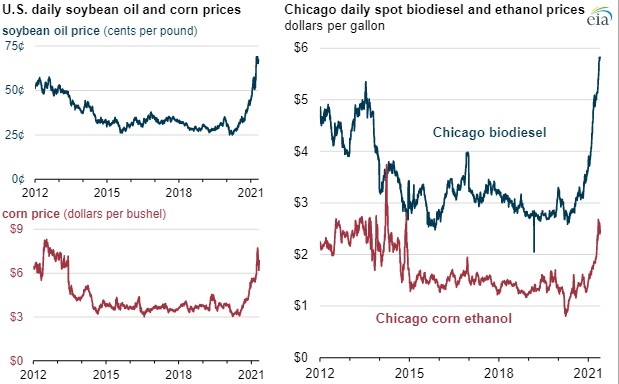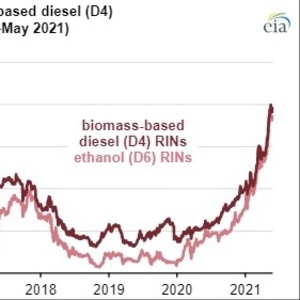Agricultural feedstock costs drive RIN prices to all-time highs



June 2, 2021
BY U.S. Energy Information Administration
The prices of renewable identification number (RIN) credits—the compliance mechanism used for the Renewable Fuel Standard program administered by the U.S. EPA—sharply increased through April of this year, and they are now higher than at any time during the 13-year history of the RFS program. Rising global demand for the agricultural feedstocks used to make corn fuel ethanol and biomass-based diesel fuels has driven fuel ethanol and biomass-based diesel prices higher in 2021, pushing their corresponding RIN prices to new highs.
Renewable fuel producers generate RINs that can be used for compliance or traded in secondary markets. Refiners and importers of gasoline and diesel are obligated parties and must generate or purchase RINs to demonstrate compliance. The higher-value RINs allow market participants to offset rising biofuel costs and to continue blending at suitable levels for RFS compliance.
Advertisement
On May 18, corn fuel ethanol D6 RIN prices reached $1.90 per gallon (gal), and biomass-based diesel D4 RIN prices reached $2.00/gal, both marking all-time high daily prices in the RFS program. As of May 28, corn fuel ethanol D6 RIN prices had increased by 129 percent since the beginning of the year, and biomass-based diesel D4 RIN prices had increased by 96 percent.
Although regulatory factors and rising RFS targets often raise RIN prices, higher agricultural feedstock costs are currently the primary reason for the high RIN prices, which are correspondingly driving up biofuel spot prices.
The two primary feedstocks for biofuels production in the United States are corn and soybean oil, which are used for fuel ethanol and biomass-based diesel production, respectively. Since December 31, 2020, U.S. corn prices have increased by 42 percent while U.S. soybean oil prices have increased by 55 percent. Both prices have reached their highest levels in more than eight years, driven in large part by increased demand from China and concerns around future domestic supply.
Advertisement
Correspondingly, the Chicago daily spot price of fuel ethanol settled at $2.32 per gallon (gal) on April 30, which was the highest price since December 2014 and an increase of 58 percent since the beginning of the year. Similarly, the Chicago spot price of biodiesel settled at $5.23/gal on April 30, marking the highest price since July 2013 and an increase of 40 percent since the beginning of the year.
Related Stories
The U.S. Energy Information Administration maintained its forecast for 2025 and 2026 biodiesel, renewable diesel and sustainable aviation fuel (SAF) production in its latest Short-Term Energy Outlook, released July 8.
XCF Global Inc. on July 10 shared its strategic plan to invest close to $1 billion in developing a network of SAF production facilities, expanding its U.S. footprint, and advancing its international growth strategy.
U.S. fuel ethanol capacity fell slightly in April, while biodiesel and renewable diesel capacity held steady, according to data released by the U.S. EIA on June 30. Feedstock consumption was down when compared to the previous month.
XCF Global Inc. on July 8 provided a production update on its flagship New Rise Reno facility, underscoring that the plant has successfully produced SAF, renewable diesel, and renewable naphtha during its initial ramp-up.
The U.S. EPA on July 8 hosted virtual public hearing to gather input on the agency’s recently released proposed rule to set 2026 and 2027 RFS RVOs. Members of the biofuel industry were among those to offer testimony during the event.
Upcoming Events










